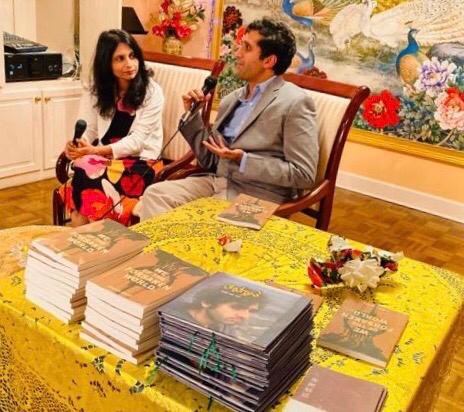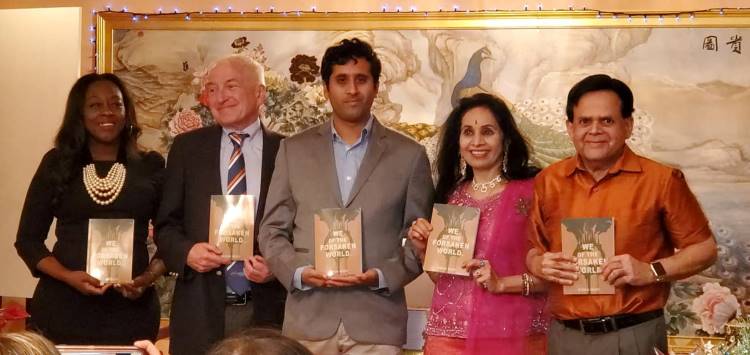BY JYOTHSNA HEGDE
Atlanta, GA, January 10, 2020: “The world is a book and those who do not travel read only one page,” quotes St. Augustine. By that definition of travel, Atlanta native, and polyglot author Kiran Bhat has reached three fourths of the book! Yes. Kiran Bhat has visited132 out of the 195 countries in the world, been based out of 18 places in the world, and knows 12 languages. He has authored six books so far, including ‘WE, of the Forsaken World’, which was launched in India and in Atlanta on January 3, 2019. The event was hosted by his parents Dr. Anu Bhat and Dr. Subra Bhat, with Chris Hines from Clayton state and Clayton County Commissioner Felicia Franklin presiding over the proceedings.
NRI Pulse’s Jyothsna Hegde moderated the launch. Bhat is currently on a tour, promoting his book and shared his experiences with NRI Pulse in an exclusive interview.
“I see myself as part of a generation of biculturals (Westerners brought up in non-Western cultural contexts) who connect first and foremost to the globe as their space of cultural formation, and I would like to further architect this identity, way of thinking, and cultural perception through my forays into writing border-less and post-national fictions,” says Bhat, who was born and raised in a suburb of Georgia, but has not lived here since 2008.
The lives and times of Bhat’s sixteen captivating characters in WE, of.. are interwoven within four settings of the “Tribe of the Silt,” a tiny remnant locked in primitive ways who foresee the world’s end, a “Global Village” a newly arisen town where natives deal with the contrast between the alluring world within their cellphones and the poverty and limitations of their locale, “The Lake of Sacred Salt” a scene of devastating tragedy when a once sacred body of water is contaminated by industrial waste, and “Black City”, a place that draws stark contrasts between the sleek modernity of the commercial district and the neglected slums.
Some inspired, some imagined, Bhat’s characters range from all walks of life, be it a rainforest shaman who is visited by horrific visions of the world’s destruction, a famous female writer who lives miserably in a mansion, tormented by her memories, or the milkmaid who is tormented by the cruelty of the more respectable girls’ gossip. The milkmaid, Bhat mentioned, was actually inspired by a milkman back in Mysore, India, who shows up every early morning to hand deliver milk.

Mystically converging his tales of global village, Bhat takes the reader on a magical journey across the globe, allowing the reader to picture a real place, be it New York, or the Amazon and people you come across in real life, be it a flamboyant young girl, or a witty vendor.
Bhat chose to present WE, of.. in a story cycle rather than the traditional novel, which is a format where collection on stories operating with their own narrative structure mesh together to form a greater whole. The links maybe through narrative, event, time, location, character, or theme. The connections can be linear or abstract. So why did Bhat pick this format over the more popular one?
“In my writings,
I try to compress our globe into a single narrative fictional space. This is a
tricky narrative to posit, because actually the world isn’t one narrative. There are over seven billion people on this
planet, and thousands of cultures, and all of it took so much time to form,
that one individual could never truly recreate the complexity of such diversity
into one space. But I want to try,” says Bhat. Envisioning a zoomed out google
map, Bhat says it is equivalent to scrolling place to place, gathering
narratives along the way with various structures to show how. Despite the
narratives not being related narratively, Bhat says they share a relation, because
they exist on the same plane of time as everything else happening, and not
happening. “That is what I wanted to represent in my fiction, and so a story
cycle allows me to tell multiple stories that replicate the myriad of stories
around us but create that vastness of a novel.”
A conversation with a tall, brunette woman, on bus trip between bus between Dubrovnik and Zagreb, Bhat says was the inspiration for WE, of…The woman had said that Croatia is one of the poorest countries in the world. “Something about that sentence inspired my imagination. After we reached the bus station, I had to sit on one of the metal benches for a few hours, and write.”
The title spares room for the readers’ imagination, according to Bhat. “What does it mean to be a ‘we’ or a multitude of the part of the world that the rest ignores? What does it mean to be ‘forsaken?’ Is it something that is chosen by that part of the world, or something to be resisted? These are the sorts of questions the title asks; a good state of mind to be in, as one opens the first pages of the book.”
Are you ready to flip through Bhat’s intense, intriguing and inventive narrative? Go grab your copy soon from a bookstore near you or meet the talented author during his tour. The book is available for pre-order on Amazon. You may check https://kiranbhatweldgeist.com for details.





